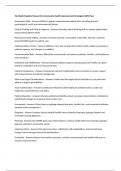Test Bank Solution Manual for Community Health Improvement Strategies 100% Pass
Assessment Skills - Answers Ability to gather comprehensive patient data, including physical,
psychological, social, and environmental factors.
Critical Thinking and Clinical Judgment - Answers Develop critical thinking skills to analyze patient data
and prioritize patient needs.
Planning and Goal Setting - Answers Formulate specific, measurable, achievable, relevant, and time-
bound (SMART) goals for patient care.
Implementation of Care - Answers Ability to carry out nursing interventions safely, adapt care based on
patient response, and changes in condition.
Communication Skills - Answers Effectively communicate care plans to patients, families, and healthcare
team members.
Evaluation and Modification - Answers Evaluate patient progress towards goals and modify care plans
based on evaluation and new assessment data.
Cultural Competence - Answers Incorporate cultural considerations into care plans to ensure respect
and responsiveness to patient's background.
Ethical and Legal Considerations - Answers Understand and apply ethical principles in care plans and
adhere to legal responsibilities.
Team Collaboration - Answers Collaborate effectively with healthcare professionals to create and
implement comprehensive care plans.
Patient Education - Answers Educate patients and families about care plans, interventions, medications,
and lifestyle changes to empower them in their care.
Assessment - Answers Collect data on garbage disposal practices, health risks, and community attitudes
towards waste management.
Diagnosis - Answers Analyze data to identify health issues related to improper garbage disposal and
formulate nursing diagnoses.
Planning - Answers Set SMART goals, plan interventions to reduce health risks from improper garbage
disposal, tailored to community needs.
Implementation - Answers Put plan into action, collaborate with stakeholders, promote behavior
change, and encourage community participation.
Evaluation - Answers Assess intervention outcomes, monitor environmental and health indicators to
measure improvements.
, Documentation - Answers Record all assessments, goals, interventions, and outcomes in community
health files for continuity of care.
Solid Waste Management - Answers Refers to the systematic control of the generation, collection,
storage, transport, treatment, and disposal of solid waste materials.
Resource Efficiency - Answers Maximizing resource efficiency through recycling, reuse, and recovery to
reduce the impact of waste on the environment.
Waste Generation - Answers The initial stage where waste is produced by households, industries,
commercial activities, agriculture, and other sources.
Waste Collection - Answers Involves gathering waste from various sources and transporting it to a
processing or disposal site.
Waste Storage - Answers Temporary storage of waste before collection to prevent environmental
contamination, pests, and odors.
Waste Transport - Answers Moving waste from the point of collection to a treatment or disposal facility
efficiently to minimize environmental impact.
Waste Processing and Treatment - Answers Transforming waste into more manageable or reusable
forms through techniques like recycling, composting, incineration, and MBT.
Waste Disposal - Answers The final stage where waste is permanently disposed of using methods like
landfills, incineration, and waste-to-energy facilities.
Resource Recovery - Answers The extraction of useful materials or energy from waste through recycling
and waste-to-energy processes.
Waste Reduction and Minimization - Answers Strategies aimed at reducing the amount of waste
generated at the source by promoting sustainable practices.
Regulations and Policy - Answers Laws, regulations, and policies established by governments to manage
waste effectively, including standards and penalties.
Public Education and Participation - Answers Informing and engaging the public in waste management
practices to ensure the success of solid waste management programs.
Landfilling - Answers Disposal of waste by burying it in specially designed landfill sites, including sanitary
landfills and controlled dumps.
Incineration (Waste-to-Energy) - Answers Burning waste at high temperatures to reduce volume and
potentially generate energy, useful for managing hazardous waste.
Recycling - Answers Converting waste materials into new products to prevent resource depletion, with
benefits like energy conservation and waste reduction.




